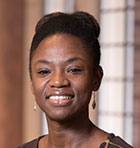
Holiday Retail
Tom Arnold, finance professor, can speak to holiday shopping trends from Halloween through New Year's, including consumer spending predictions, physical vs. online sales, and other retail stories.
"The economy has managed to avoid a recession due to the Federal Reserve managing the interest rate to create the “soft landing.” Despite the soft landing, consumers view the current price levels due to inflation as a real problem," said Arnold.
"The effects of inflation relative to holiday spending emerge in two forms: 1) the consumer is spending more, but is actually buying less and 2) consumers are purchasing the same number of items, but are substituting lower priced items for what they used to buy. It is very likely a combination of both types of consumer behavior have already been occurring and will continue to occur into the holiday season this year."

Food Science & Holiday Nutrition
Julie Pollock, a chemistry professor and biochemist, can discuss the science behind some holiday favorites, including how to maximize nutritional value. For example, if buttered collard greens are a standard on your Thanksgiving table, that’s a good thing.
“The vitamins in greens are fat soluble and need to be consumed with a fat for you to experience the full nutritional value and absorb the vitamins,” Pollock said. “Eating greens plain may give you some fiber, but it’s a waste of vitamins. It’s a great way to feel better about butter!”
Collard greens — a stand-in for green bean casserole at the holidays for some families — provide the following vitamins if consumed with a fat: vitamin A, vitamin C, vitamin K, and vitamin B-6. They are also a good source of calcium, iron, and magnesium.
She can also speak to how different types of fats affect pie crust.
More About Julie Pollock
Christmas Creep
Janelle Peifer, psychology professor, can discuss "Christmas Creep" and why it's stressful.
"The creep of the holidays can trigger feelings of inadequacy for some," said Peifer. "People may wonder, ‘Am I behind the curve on preparing for the holidays? What if I can’t afford the trappings of the holidays being presented? Am I letting down myself or my family in some way?"
More About Janelle Peifer
Hayes Holderness
Law professor Hayes Holderness, a tax law expert, can discuss why certain types of candy are taxed while others are not.
"Picture your two favorite candies;

Holiday Cooking
Andy Kerscher, chef de cuisine, can offer cooking tips for home cooks and chefs on improving their meals throughout the holiday season.
"Try to bring the comfort of home and the holiday traditions that guests are familiar with in order to give them an experience that is memorable and exciting, while also starting their own traditions," Kerscher said.
More About Andy Kerscher
New Year's Brain Tune Up
Kelly Lambert, professor of behavioral neuroscience, can offer tips for tuning up your brain in the New Year.
"When the calendar flips to a new year, it’s common to reflect on the past and look to the future. According to the neuroscience literature, this anticipation could be one of the most pleasurable – and healthy – tasks our brains engage in all year long,” said Lambert.
More About Kelly Lambert
Deep-Fried Turkeys
Kristine Nolin, chemistry professor, can discuss the science behind deep frying turkeys.
"Deep-frying a turkey is a great way to get a delicious, moist meal for Thanksgiving. But this method of cooking can be a very dangerous undertaking," said Nolin.
More About Kristine Nolin
Sticking to Your Resolutions
Camilla Nonterah is a counseling psychologist who can suggest how to stick to New Year's resolutions.
“Change for the right reasons. Change for a desire to improve one’s health, to be a better example for your family or to prolong your life, are more likely to motivate positive change,” Nonterah said.
More About Camilla Nonterah
Spiders
Jennifer O'Donnell, biology instructor and animal care expert, cares for and studies a variety of tarantulas, including Tarrant, the Spider men's basketball team's live mascot.
“Caring for Tarrant and our other spider friends has been a rewarding experience for the biology department, for me, and for the University of Richmond community as a whole," said O’Donnell. “Spiders are fascinating creatures, and we are grateful for the opportunity to keep learning about them and sharing our love of all spiders.”

Holiday Wellness
Heather Sadowski, director of health promotion, can speak to meeting wellness goals despite holiday temptations.
"When it comes to food, remember the three “M’s” – moderation, mindfulness,
